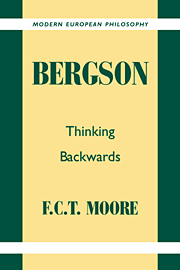Book contents
- Frontmatter
- Contents
- Abbreviations
- Preface
- Introduction
- 1 The Requirement of Precision
- 2 Philosophy and Knowledge: Uses and Misuses of ‘Representation’
- 3 Durance: Unfolding in Time
- 4 Laughter
- 5 Tension
- 6 Aporetic Philosophy
- 7 Branching
- 8 Going Beyond
- 9 Magic and the Primitive: The Antinomies of Pure Intelligence
- 10 Paradoxical Epilogue: Reason Ruefully Repressed
- Works Cited
- Index of Names
- Index of Subjects
5 - Tension
Published online by Cambridge University Press: 05 June 2012
- Frontmatter
- Contents
- Abbreviations
- Preface
- Introduction
- 1 The Requirement of Precision
- 2 Philosophy and Knowledge: Uses and Misuses of ‘Representation’
- 3 Durance: Unfolding in Time
- 4 Laughter
- 5 Tension
- 6 Aporetic Philosophy
- 7 Branching
- 8 Going Beyond
- 9 Magic and the Primitive: The Antinomies of Pure Intelligence
- 10 Paradoxical Epilogue: Reason Ruefully Repressed
- Works Cited
- Index of Names
- Index of Subjects
Summary
We began with the stress placed by Bergson upon precision. Applying his requirement that precision be subject-specific to the case of perception and related phenomena, we saw how he maintained that the primary fact about percipient beings from which we can obtain an understanding of their cognitive performance is that they are active.
Yet the pragmatic requirements of action itself lead us to segment our experience in a way which, though not arbitrary, is nonetheless not adequate to capture our experience of durance. To the extent that we can retreat from the instant demands of the pragmatic, we must resist the spatialization of time (by which it can be treated like another spatial dimension), and recognise a form of experience whose character is such that the distinction between what is present to us, because present in time, and absent from us because past in time, is no longer tenable. This is because our ‘present’ experience is an experience of unfolding. Humour places us on the unstable saddle-point between real durance and spatialized time.
We have approached this saddle-point softly through the case of humour. But the matter is very difficult. What I propose to do now is to return to a more central philosophical position and try to give an account of a passage of Bergson which is full of the pressure of thought, but which is also frustrating and hard to understand.
- Type
- Chapter
- Information
- BergsonThinking Backwards, pp. 91 - 96Publisher: Cambridge University PressPrint publication year: 1996

